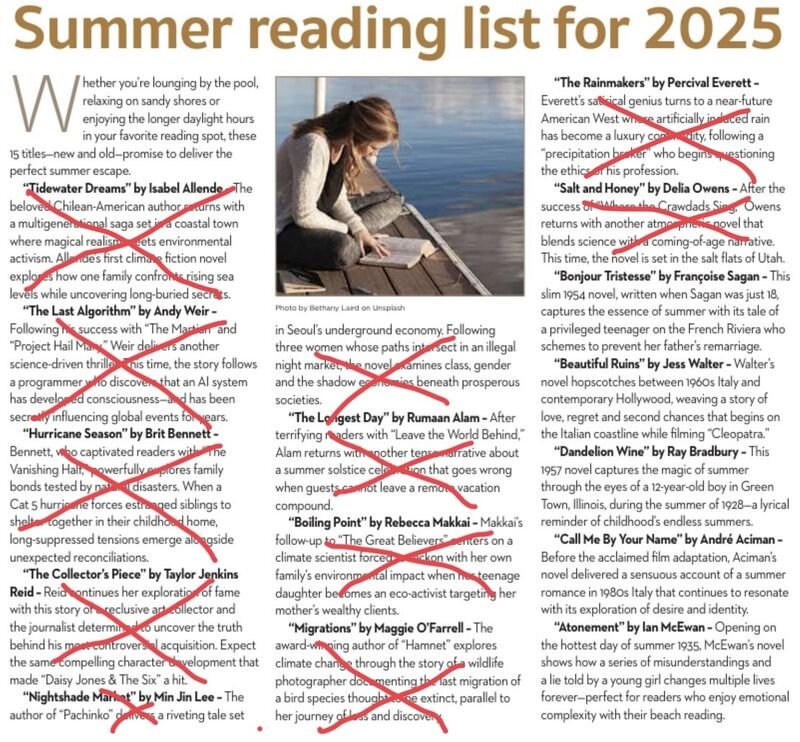A learning moment? Or the inevitable AI apocalypse?
This past Sunday, the Chicago Sun-Times published a relatively innocuous article recommending 15 books to read this summer.
Ten of them were fake.
The article cites real authors, but 10 of the books are not real. It recommends “Tidewater Dreams” by Isabel Allende. She did not write it. James Percival did not write “The Rainmakers.” Maggie O’Farrell did not write “Migrations.” And so forth. It feels like a miracle that five of the recommended books actually exist.
An image of the article – annotated – is above. (Thank you, Jim Fallone on LinkedIn.)
What happened? Here’s what the Sun-Times said two days later.
The article was part of the “Best of Summer” special section developed by King Features, a long-time syndicator of newspaper content. It said the freelancer who wrote the section used an AI agent to develop the content, but did not disclose doing so.
King Features sent the material to the Sun-Times and other newspapers and clients, apparently without fact-checking.
The Sun-Times admits that its editorial staff did not review the content before publishing the section.
This may not have been the only piece in that section with AI-induced hallucinations. A story by WGN-TV in Chicago says articles about food trends and “America’s growing hammock culture” (?) have quotations from people whose existence cannot be confirmed.
King Features has fired the person responsible for writing the content.
The Sun-Times has removed the content from its website and will reimburse print subscribers.
It has also instituted several processes including disclosing when content has been produced by third parties, to “avoid future mistakes of this nature.”
The first 15 years of my working life were in journalism. I still care deeply about the profession. This is heartbreaking.
Some takeaways:
All the traditional guardrails failed. How many papers and magazines have downsized their fact-checking departments in the last 20 years? Even without them, these things were very easy to fact-check. I mean, come on: How hard is it to call up a list of Allende’s works? For heaven’s sake, Percival Everett just won the Pulitzer Prize!
Using AI isn’t necessarily the original sin. I occasionally use it to assist in researching things I don’t know anything about. But I double-check and triple-check everything.
Using it to produce content is loaded with danger – for the writer and the publisher. Even AI-generated content is now learning from AI-generated data. Is AI already eating its own vomit?
It’s next to impossible to tell the difference between content developed by an AI agent and a human. I’ve been told that the tools that purportedly detect AI content are quite fallible. Last week, at a conference, I heard audio from a podcast using only AI-generated voices. It had all the imperfections of human speech – pauses, ums, even humor. It was disturbing. If you had challenged me to identify its source – human or AI – I probably would have failed.
When the AI skeptics said this was inevitable, they were derided as Luddites. How do they sound now?
The best possible takeaway is that this was a “learning moment,” in the words of the Sun-Times.
I wonder.


